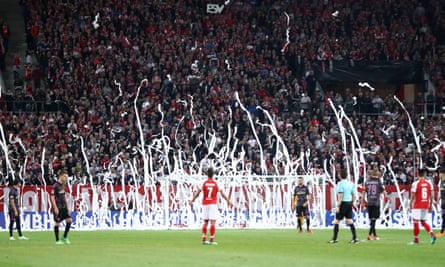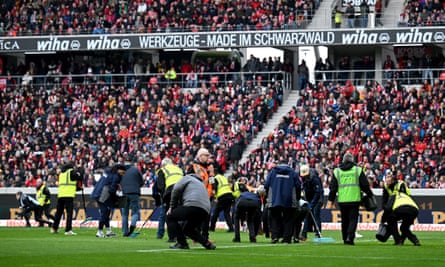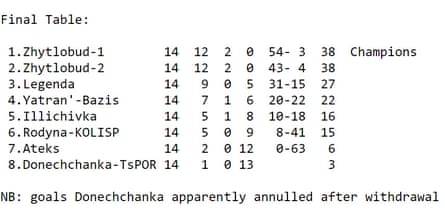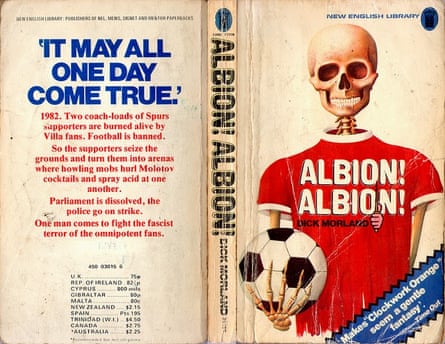“Last month’s Eliteserien game between Rosenborg and Lillestrøm was abandoned when fans threw tennis balls and fish cakes on to the pitch in a protest against VAR. Apart from a pig’s head, what other peculiar items have been thrown on to a football pitch?” wonders Håvard Johansen.
We had this question in 2006, but that was 18 years ago and folk have been lobbing all sorts since then. First, let’s have a quick recap of the identified flying objects we mentioned back then.
-
A pig’s head Barcelona v Real Madrid, 2000-01 (Luis Figo’s return)
-
Mars bars Newcastle v Spurs, 1988-89 (Paul Gascoigne’s return, although Chris Waddle was also encouraged to work, rest and play)
-
A half-eaten hamburger Liverpool v Man Utd, 2005-06 (for the attention of Gary Neville)
-
Tennis balls Bolton v Hull City, 1998-99 (protest against David Lloyd)
-
A scooter Internazionale v Atalanta, 2000-01 (it didn’t quite make it onto the field but three points for trying)
-
A bottle of rum and a living cat Sevilla v Betis, 2005-06
-
The front half of a dead cat Charlton v Luton, 1981-82
-
Pants Reading v Wrexham, 1999-2000 (because Reading were pants)
-
A car door New Zealand v Chile, 1998
-
A wheelbarrow América v São Caetano, 2004 (during a post-match brawl)
-
A hand grenade Brentford v Millwall, 1965-66 (for the attention of Chic Brodie)
Never mind the front half of a dead cat, there have been plenty of other things thrown onto the pitch at the Valley.
“We had club shop catalogues on the pitch when Steve Brown was sent off by a young Mike Dean against Leicester City while being carried off on a stretcher,” writes Marlon Seton. Then, in protest at our miserable Belgian owner, we have had plastic pigs, and tennis balls, and I think there was a third protest. I can’t remember what the object was then. Finally, after the last game of our relegation season, the fans’ sofa was torn to bits and scattered across the pitch.”
In Toronto, cushions were thrown onto the field not in protest but celebration. “When Danny Dichio scored Toronto FC’s first ever goal in 2007, many in the crowd launched their circular-and-stiff-enough-to-use-as-a-frisbee seat cushions onto the pitch!” writes Michael Thomas. “No idea how long it took to clear them off the pitch. Nor whether the fans were given replacement cushions.”
Other objects that have made their way onto a football field since the original question include a beach ball (Sunderland v Liverpool, 2009-10), a cabbage (thrown at Steve Bruce before Aston Villa’s 3-3 draw with Preston in 2018-19), a dildo (Alaves v Liverpool, 2000-01) dead rats (Brondby v FC Copenhagen, 2017), a coconut (Hearts v Hibs, 2018-19), toilet roll (Mainz 05 v Freiburg, 2017-18), a a lamb shank (Ballymena United v Distillery, 2007-08) and a severed bull’s head (Dynamo Dresden v RB Leipzig, 2016-17).

Jack Hayward brings us up to date with a couple of stories from last season.
“In the 12th minute of 1. FC Koln’s 4-0 home defeat to Borussia Dortmund on 20 January, supporters of both clubs pelted chocolate coins onto the field of play, resulting in the match being delayed by eight minutes,” writes Jack. “The action was in protest against a vote by German clubs which approved the sale of television rights in exchange for investment capital.

“Fireworks are sadly not an unusual thing to throw onto the pitch, but the reason Ajax fans threw them against Feyenoord on 24 September 2023 bears mentioning. The KNVB enforces a strict rule that if a match is delayed due to objects being thrown on the pitch twice, the game is abandoned. Ajax fans, bored of watching their team go 3-0 down in De Klassieker, deliberately lit flares and threw them onto the field continuously until the referee gave them permission to beat the traffic. The game resumed behind closed doors a few days later, with Santiago Giménez completing one of the longest hat-tricks in history to give Feyenoord a 4-0 win.”
The Invincibles
“With 10 games remaining in the Chinese Super League, both Shanghai Shenhua and Shanghai Port are unbeaten and running away with the league. If it stays that way will this be the first time two teams from the same city have completed unbeaten seasons?” asked despondent Beijing Guoan fan Cameron McGlone a couple of weeks ago.
We need to strike before the iron gets even colder. On Sunday, Shanghai Shenhua lost 2-1 at Beijing Guoan, with Wang Ziming committing an act of triviacide by scoring a 97th-minute winner. It ended a run of 43 league games this season in which they and Shanghai Port had avoided defeat.
Port are now five points clear of Shenhua with eight games to play, and the two teams meet in a massive game on 17 August. If you want some human stories to go with the numbers, we recommend this piece by John Duerden.
Even if both teams had gone the whole season unbeaten, they would not have matched this gem from the Ukrainian Women’s League in 2014.

“Not only were the two teams from the same city, they had only one character of difference,” writes Mykola Kozlenko. “The teams were affiliated to two main construction holdings of Kharkiv and were named Zhytlobud-1 and 2 (Zhytlobud means ‘housing construction’ in Ukrainian). The teams are better known as Metalist 1925 Kharkiv and Vorskla Poltava.
“They were dominant for most of the 2010s, but the 2014 season is unique: they didn’t drop points against any other teams, the two games between them were drawn and Zhytlobud-1 were champions on goal difference.”
Fact or fiction?
“I remember years ago looking at (but not actually buying) a book in a shop. It was a novel set in a future where football had been completely banned because of hooliganism, but the stadiums remained and gangs of ultras still got together in them to fight each other. The cover showed a skeleton in a football kit. Does anyone have any idea what this book was?” asks Chris Matterface.
“I believe the novel Chris refers to is Albion! Albion! by ‘Dick Morland’, aka crime writer and contributor to 90% of my mum’s bookcase, Reginald Hill,” says Ross Wilson. “The book’s premise also includes an overthrow of the British government, with the football ban becoming a pretext for a violent, fascist uprising. This was considered pretty outlandish when the book was published in 1974. Thank goodness time has proven the critics right, and fascism is in NO WAY causing any problems in Britain today.
“I’ve attached the spooky cover Chris describes.”

The number of responses mentioning Albion! Albion! make us confident this is the book Chris had in mind. But you can never read enough dystopian novels these days, so here’s another that appeared in our mailbag.
“Chris’s description sounds a lot like the graphic novel Hors Jeu by the French/Serbian writer Enki Bilal,” writes Mathias Zilstorff. “It also features a machine-like Norwegian striker, referees going in to hiding for fear of reprisals, and matches been moved to more and more absurd locations due to commercial interests. It is quite short and dystopian but interesting nonetheless.”
Knowledge archive
“When was the last season (if indeed there ever has been one) that all the clubs in the English top division finished the season with the same manager they had at the start?” wondered Tom Shaw. in 2011.
The answer is 1965-66. Perhaps imbued with pre-World Cup bonhomie Blackburn stuck with ‘Jolly Jack’ Marshall despite barrelling headlong towards relegation, ending bottom with the lowest points tally in 19 years (though he was sacked midway through the following season – “This post at Ewood Park has been likened more than once to what the Americans call a ‘hot seat’,” reported the Guardian at the time). Dave Bowen, who was also moonlighting as the Wales manager, survived at Blackburn’s fellow relegatees Northampton.
Fulham, despite a relegation-threatened season, stuck with Vic Buckingham; Ian McColl, appointed during the summer of 1965, survived at Sunderland who finished 19th; Nottingham Forest stayed up by three points and kept faith with the softly-softly approach of Johnny Carey (“Some of their tackling, while never vicious, lacked the finesse and complete inoffensiveness of a team managed by Mr Carey,” wrote the Guardian after a mid-season 1-1 draw at Manchester City. “Forest, like so many clubs, have had to adapt their style to meet modern requirements, although Mr Carey would never instruct his men to ‘mix it’.”) Above Blackburn nine teams ended the season separated by four points – perhaps this was a rare – and final? – example of clubs choosing the devils they knew.
The detente didn’t last, however. Arsenal started the 1966-67 season with a new man in charge, Billy Wright having resigned in June.
Can you help?
“Has any player scored more hat tricks at a major tournament that didn’t result in a winning performance than Barbra Banda at the Olympics?” asks Jack Tanner.
“In last season’s Eredivisie, De Klassieker had an aggregate score of Feyenoord 10-0 Ajax. Have any other derbies had such a lopsided scoreline across both legs of a season?” wonders Jack Hayward.
“What’s the shortest time a player has taken to win their first trophy?” asks David Taylor. “And what’s the longest?”
“Has any player scored more hat tricks at a major tournament that didn’t result in a winning performance than Barbra Banda at the Olympics?” tweets Jack Tanner.
-
Mail us your questions or tweet @TheKnowledge_GU
Source: theguardian.com


















